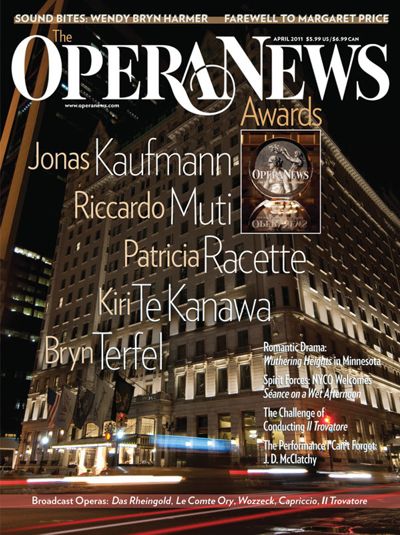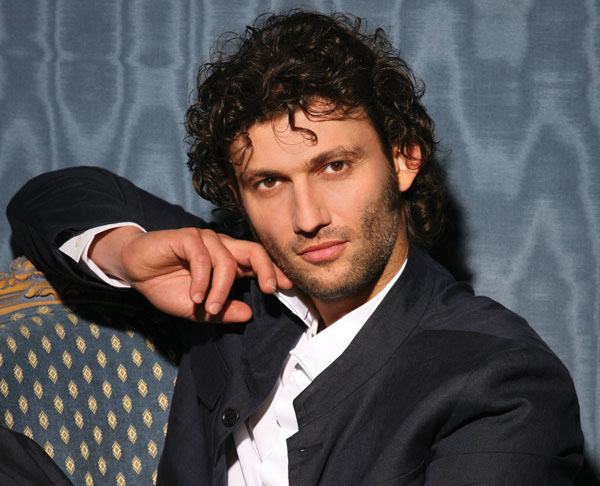|
|
|
|
|
|
|
| Opera News 4/2011 |
| by LOUISE T. GUINTHER |
The OPERA NEWS Awards: Jonas Kaufmann
|
|
|
  "Mesmeric"
is a term much used but seldom earned; yet in the case of Jonas Kaufmann it
barely suffices to describe his effect on an audience. There is a hypnotic
intensity to his gaze, an overwhelming emotional pull to his singing that
draws us directly into his imaginary world. Kaufmann makes us believe so
wholeheartedly in him personally that he enables us to suspend our disbelief
in everything around him as well. "Mesmeric"
is a term much used but seldom earned; yet in the case of Jonas Kaufmann it
barely suffices to describe his effect on an audience. There is a hypnotic
intensity to his gaze, an overwhelming emotional pull to his singing that
draws us directly into his imaginary world. Kaufmann makes us believe so
wholeheartedly in him personally that he enables us to suspend our disbelief
in everything around him as well.
"I get so absorbed in my roles,
it's like a drug," he has said. His way of projecting character through body
language and facial expression is at once powerful and restrained, rich in
detail and utterly riveting. Just watch his eyes when he is onstage: there
is not one instant of hesitation, of doubt about what his character is
feeling or where his thoughts are focused. He lives the role fully from his
first entrance, and if a particular moment looks or sounds different from
the way you remember it in a favorite predecessor's performance, there is
such keen dramatic awareness in Kaufmann's choices that you can only admire
him for proving that it can be just as powerful done another way.
These are rare qualities; rarer still is his determination to make the work
itself the guiding force behind every impulse, vocal or visual. A great
opera singer achieves his effects not merely through histrionic instinct and
native charisma but through the music and the text. In an era of
idiosyncratic, self-conscious and often wayward approaches to the dramatic
side of opera, Kaufmann has the courage to surrender himself to the message
inherent in libretto and score. Whatever oddball setting surrounds him,
whatever unlikely business he is saddled with, he finds a way to bring the
creators' original intentions to life. Place his Lohengrin on a Playskool
construction site, and he will convince you that the laying of bricks and
smearing of mortar are acts of the tenderest romantic devotion. Oblige his
Werther to sing "O nature" on a set devoid of flower, grass or tree, and he
will conjure an enchanted vista through the enraptured expression in his
eyes.
According to family lore, Kaufmann recognized his calling at
the age of five, when he saw his first opera. Studies at the Hochschüle für
Musik in his native Munich led to a debut in Saarbrücken and a contract at
Zurich Opera, where he began to build the reputation that has since led him
to all the great opera houses of the world. No doubt his slender physique,
melting brown eyes, mop of ultra-romantic brown curls and perpetual five
o'clock shadow played an initial part in drawing the attention of the opera
world. But it is this singer's commitment to musical drama — an approach
both intelligent and instinctive, his passionate nature rigorously
disciplined to produce the effect of spontaneity within the confines of a
secure technique — that has raised him to the top of his profession.
Kaufmann's is essentially a lean, compact sound with a mellow, silvery
sheen, but it can acquire a dark, hooded quality in moments of desolation,
or blossom into a warm, golden glow at the upper end of an arching, lyrical
line. He knows how to build a phrase over a long stretch via beautifully
integrated dynamic and rhythmic modulations. Yet listening to him, one never
stops to marvel at any one specific skill; one is too caught up in the
overall sweep of the vocal line as a conveyer of torment or passion, fury or
sacred duty or despair.
Perhaps it was spending his formative years
in multilingual Switzerland that allowed Kaufmann to develop an equally
strong affinity for French, Italian and German repertoire. He is an echt
Florestan, a highly Gallic Don José, a fervent interpreter of Verdi's
quintessentially Italian Requiem. He seems entirely at home in all three
languages and styles, and in each one, the words come across indelibly in
the miraculously pristine diction that, for Kaufmann, is not merely a
technical accomplishment but an essential expressive resource.
In a
video of his Zurich Florestan from 2004, Kaufmann's Christ-like appearance,
enhanced by a distinct halo of backlighting, is perfectly matched by an
inner radiance that shines not only from his eyes but in his clear, luminous
voice. For a brief moment, this prisoner's sense of oppression and
degradation is audible in the bleak, covered sound that emerges in his
initial outcry, "Gott! welch Dunkel hier!" — a sound at first so colorless
and drained of life as to suggest an emanation from beyond the grave. But
led by librettist Sonnleithner's words of unconquerable faith, and by
Beethoven's gradually soaring melody, Kaufmann allows the vibrancy to flood
back into his tone, so that by the time he arrives at Florestan's defining
declaration — "Doch gerecht ist gottes Wille!" — there is no mistaking the
indomitable spirit that has kept this forlorn and forgotten man alive.
Though the staging allows him no more than the barest movement, Kaufmann
times those minimal moves so aptly to the shifts in musical tone that he
seems literally to be riding the phrase as he rises as high as his fetters
will permit him and then falls prostrate again.
Kaufmann is a tenor
for our time — one who can channel the hopes and passions of an earlier,
less cynical era and bring them to palpable life for us today. His deeply
personal connection with the music engenders an equally intense desire to
communicate that connection with the public. There is no sense of
calculation in his singing: he seems genuinely, literally inspired — in the
grip of forces outside his own control. He once offered this explanation of
his modus operandi: "You squeeze as many emotions out of your soul as you
can, and fill up your sound with those feelings." And isn't that marriage of
sound and substance the one true essential — the very thing opera is all
about?
|
|
|
|
|
|
|
|
|
|
|
|
|
|
|